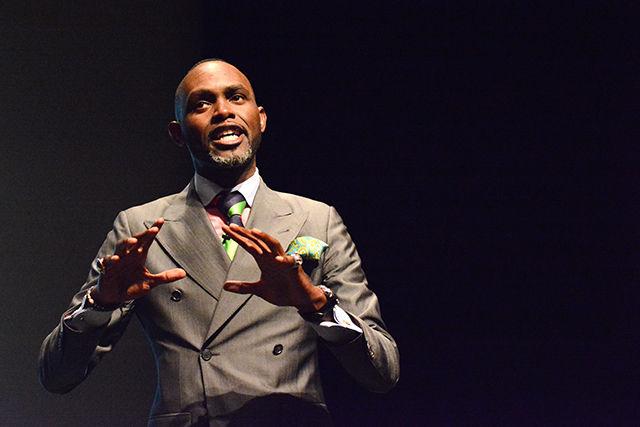CNN’s 2011 Hero of the Year Derreck Kayongo visited NC State Monday night. Kayongo spoke to a crowd in Talley Student Union to talk about his experiences that lead him from a life of a refugee to the founder of the nonprofit organization, Global Soap.
In 2011, Kayongo also received the Refugee Services Award for his organization’s work. Monday’s event was hosted by Goodnight’s Scholars and gathered a crowd of roughly 200.
The organization recycles used hotel soap and sends it to people in developing countries overseas. Kayongo hopes that his Global Soap project will help deal with easily preventable diseases caused by a lack of hygiene.
“People are dying of very simple things like diarrhea,” Kayongo said.
Global Soap is currently in 92 countries around the world. Kayongo said his goal is to, one day, make that number 10 million bars of soap.
Kayongo’s story started in Uganda where he was born.
“My parents came out of independence thinking they were going to be teachers,” said Kayongo. “They don’t pay very well to be teachers, so instead my parents said they will become entrepreneurs. My father became a soap maker and my mother become a seamstress for wedding dresses.”
In 1971, Uganda faced a military coup that took control of the country and executed a number of mass killings. The violence forced Kayongo his family were forced to flee to Kenya after their village was attacked in 1979. It was there that Kayongo was taken in and cared for by an American woman from Pittsburgh. With her help he eventually made his way to the United States.
“I get to the hotel, and there were three bars of soap,” said Kayongo. “There is facial soap, and body soap, and hand washing soap. I take two bars and put them into my bag for tomorrow. The next day they add more soap. I steal soap for three days. Then I got afraid they will charge me for the soap, so I took it downstairs to the concierge who is African-American. I told him I have been stealing the soap because they keep bringing more to the room. He laughed and said ‘then everyone has been stealing soap.’”
Kayongo’s fascination with the hotel soap wasn’t because of its scent or quality but because of the sheer abundance of it. When Kayongo questioned the hotel’s concierge about the fate of the unused of partially used bars, the concierge informed him that the soap that wasn’t used would just be thrown out.
“I asked about what about the partially used bars of soap,” Kayongo said. “He said they throw them out. I was surprised. Every hotel did that. I go to my room and all of a sudden I get an epiphany. That’s how I began to think about recycling soap.”
It was 10 years before Kayongo revisited his idea of recycling soap. After finishing school he began to realize that recycling it would be a unique challenge. Eventually Kayongo developed a way to repurpose the partially used soap. The used layers of the soap have to be shaved off with potato peelers by volunteers. Then the soap is crushed into a powder and stored in Ziploc bags. After a week moisture is added and then the soap is placed in a machine that compresses it and ass heat, molding it into one large bar of soap that will eventually be cut into smaller ones.
Samples of the soaps are sent to lab in Cincinnati where it is tested for pathogens such as E. coli. Once it is determined to be clean, it is sent to various countries. This summer, Kayongo’s recyclyed soap was sent to Liberia to help fight the Ebola virus.
During his talk, Kayongo told students that if they learn anything during their time at college, it would be to find a mission in life.
“Really pay attention to skillsets and talents that you have,” Kayongo said. “I didn’t think I was going to be a recycler of soap. I thought I was going to go to law school. Life has a way of calling you if you are paying attention. There are things you are born to do that are your destination. If you take your academia and tether that to your destination, you will have the best gift you will ever have.”








